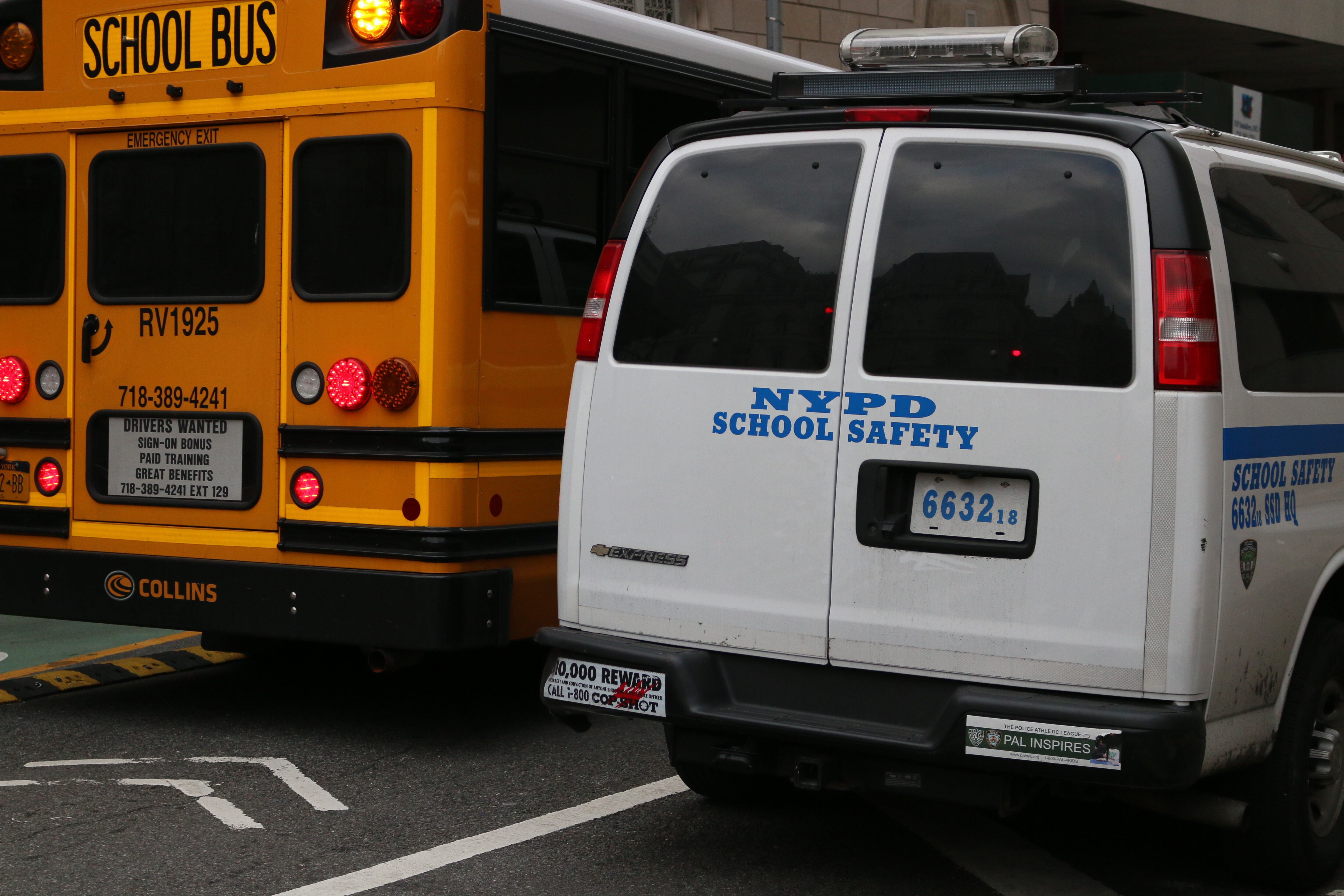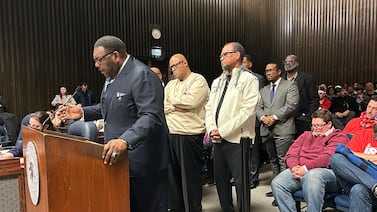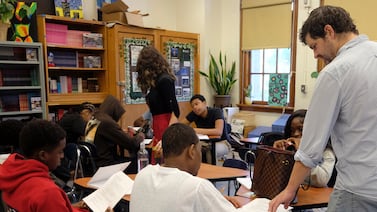The number of school safety agents stationed in New York City public schools plummeted more than 20% during the pandemic, a decline that Mayor Eric Adams is not planning to reverse, according to a report released Tuesday.
Before the pandemic hit, there were roughly 5,000 safety agents assigned to schools. As of late last month, that number had plunged to 3,900, which the report from the Independent Budget Office, or IBO, attributed to attrition and pandemic hiring restrictions. The agents are employed by the police department, unarmed, and primarily responsible for keeping an eye on building entrances, responding to student behavioral issues, and operating metal detectors at dozens of campuses.
Adams’ preliminary budget proposal for the next fiscal year calls for eliminating 282 vacant safety agent positions on top of 550 that were nixed last year. The move is part of a broader effort to wring savings out of the city’s budget: In 2019, the city spent $395 million on safety agents, and the mayor’s proposal for next year allocates $359 million.
Nick Martin, an education budget expert at the IBO, said there was no indication the city plans to significantly expand the safety division to pre-pandemic levels over the next four years. “Just based on the budget for the remaining years of the financial plan, there’s no scaling back up,” he said. “It seems to indicate that the headcount is going to continue closer to this current level.”
The city’s school safety division has long been the subject of intense debate. Critics worry stationing police department employees in school buildings can criminalize student misbehavior. They believe resources should instead be redirected toward mental health services. Supporters counter that the safety agents are essential for maintaining order. Students, parents, and educators generally report on annual school surveys that the agents help keep schools safe and respectful, though children at predominantly Black schools are somewhat less likely to agree.
Eliminating hundreds of school safety agent vacancies came as a surprise to some observers. Adams, a former police officer, and schools Chancellor David Banks, who once served as a school safety agent, have raised grave concerns about student well-being and support measures to beef up school security.
At a press conference in September, Banks specifically touted efforts to hire more safety agents. In January, he declared a “state of emergency” over neighborhood youth violence, pointing to shootings — sometimes occurring just after school and near campuses — that have led to serious injuries and deaths. Schools have also dealt with an uptick in students bringing weapons to school, often for self-defense during their commutes.
Spokespeople for Adams and Banks did not respond to questions about whether the decision against filling 832 safety agent vacancies represents a change in safety strategy or if the city is unable to find enough new recruits to take the jobs, which offer a starting salary just shy of $35,000. Officials previously announced a suite of other school-safety strategies, including plans to coordinate weekly meetings between school leaders and police department precincts, pairing 138 schools with violence interrupters and mentors, and locking building entrances during the day.
Amaris Cockfield, a City Hall spokesperson, said there are currently over 4,100 school safety agents. She noted that a new crop of 250 agents will begin in April, though she did not suggest the city is planning to return to pre-pandemic staffing levels.
“We will continue to build on the productive steps we have taken thus far and invest in a holistic vision of public safety that keeps our youngest safe,” she wrote in an email.
Mixed reactions over reducing ranks of school safety agents
Some educators and union officials, including those representing school administrators and safety agents, said they were frustrated by the reduction in school safety staff.
One school administrator in the Bronx, who spoke on condition of anonymity, said her school building consistently has two or three agents, down from four or five before the pandemic.
That has led to situations where staff, including a paraprofessional, have been pulled away from working with children to monitor the front desk while the safety agents attend to situations elsewhere in the building. Recently, a fight broke out in the school’s gym that proved so overwhelming to the limited school safety staff that school administrators called outside police officers to break it up.
“There’s a lot more stuff happening in school still,” said the administrator, noting that students are using drugs and vaping more, and many are struggling with social emotional issues that can spiral into outbursts. “It’s crazy that they would eliminate those positions especially when safety is an issue.”
The police department did not share information about safety agent staffing levels in specific regions, according to the IBO report, making it difficult to know how the reduction in headcount is affecting individual campuses.
Hank Sheinkopf, a spokesperson for Teamsters Local 237 which represents school safety staff, criticized the mayor’s budget proposal. He said retaining agents is a major challenge given the low pay.
“This has got to be a priority,” he said. “What is more important than protecting school children?”
Still, advocates who have long supported reducing the police department’s footprint in schools said the mayor’s budget represented a step in the right direction.
Jasmine Gripper, executive director of the Alliance for Quality Education, noted the previous size of the school safety division by itself represented one of the largest police forces in the country.
“I would hope that they have come to realize that this is an area where they’re overspending,” she said, “and instead could redirect these resources to mental health programs and restorative justice.”
Alex Zimmerman is a reporter for Chalkbeat New York, covering NYC public schools. Contact Alex at azimmerman@chalkbeat.org.





